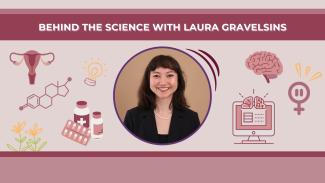Interviewee: Dr. Laura Gravelsins, Postdoctoral researcher, University of Toronto, Centre for Addiction and Mental Health |Authors/Editors: Romina Garcia de leon, Janielle Richards (Blog Co-coordinators)
Published: October 11th, 2024
Can you tell us a little bit about your research?
There's a large body of literature to suggest that menopausal hormone therapy (MHT) may benefit brain aging in females and reduce their dementia risk. However, not all females show memory benefits when taking MHT. The main goal of my research is to understand why there's such a varied cognitive response to MHT. MHT comes in many forms, for example, it varies in dosage, formulation, route of administration, and timing of initiation. These many forms of MHT are usually not accounted for in research. By accounting for the various forms of MHT, as well as other biological and lifestyle factors, we aim to clarify why some, but not all, females show memory benefits when taking MHT. Our goal is to move toward personalized or precision medicine, and identify effective formulations of MHT that will support healthy brain aging in all females.
What led you to do this work?
I think where it really started is in my undergraduate studies. I was taking a physiology course which was very content heavy. We reached the unit on female reproductive physiology and I remember it was skimmed over quickly. We were encouraged to refer to the textbook for more detail, rather than having the topic prioritized in lectures. This experience made me realize that women's health isn’t given the attention it deserves. Fortunately, around the same time, I stumbled upon a research article by Dr. Emily Jacobs that explored the interactions between the menstrual cycle and dopamine levels, and how these interactions affect working memory. This was the first article I encountered that combined a female-specific factor with neuroscience. It opened my eyes to the endless possibilities within this area of research, and made me realize that female-specific health factors are actually something that can make your research more interesting, rather than be a complicating or nuisance variable. I think I was very lucky to have had this realization at this stage in my research journey. This motivated me to focus on women's health research during my undergraduate studies, then my graduate work, and that’s how I ended up here today.
Are there any findings that you can share with us?
My PhD research focused on females with surgically induced menopause, specifically those with risk-reducing bilateral salpingo-oophorectomy (BSO) because they carry a genetic mutation that puts them at a higher risk for breast and ovarian cancers. Unfortunately, early ovarian cancer detection techniques are poor, so the best preventative option for these individuals is to get their ovaries removed when they're quite young. BSO is recommended as early as 40 years old, several years before spontaneous/natural menopause.
There is substantial research indicating the importance of ovarian hormones for brain health in later life. Previous studies, including work from Dr. Walter Rocca's lab, have shown that females with bilateral oophorectomy may be at greater risk for dementia without MHT. In our research, we recruited midlife women, averaging in their mid-40s, to assess changes in memory, sleep patterns, and brain function, while also evaluating the effects of estradiol-based MHT. Overall, we found that estradiol-based MHT benefitted working memory, sleep, and hippocampal volume, but was not fully protective. When plotting individual data points, we observed that for some individuals estradiol-based MHT works really well. For others, it's not as effective.
What’s next for you and your research?
My background has been primarily in quantitative research, so looking at performance metrics from neuropsychological tests and memory assessments, and quantifying brain volumes and hormone levels to understand individuals. I’m hoping to incorporate more qualitative components into my research next. Adopting a mixed-methods approach, which combines both quantitative and qualitative data, would allow me to explore how individuals perceive their memory changes and can provide rich insights that numbers alone may not capture. Even if someone does not score low on a quantitative measure, their subjective experience is really valuable. I hope to incorporate this qualitative perspective into my future work.
